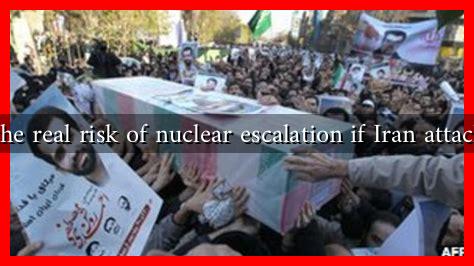-
Table of Contents
What is the Real Risk of Nuclear Escalation if Iran Attacks Israel?
The geopolitical landscape of the Middle East is fraught with tension, particularly between Iran and Israel. The potential for military conflict between these two nations raises significant concerns about nuclear escalation. This article explores the implications of a hypothetical Iranian attack on Israel, examining the risks of nuclear escalation and the broader consequences for regional and global security.
The Context of Iran-Israel Relations
Iran and Israel have been adversaries for decades, with their rivalry rooted in ideological, political, and territorial disputes. Key factors contributing to this animosity include:
- Iran’s Nuclear Program: Iran’s pursuit of nuclear technology has raised alarms in Israel and the international community, leading to fears that Iran could develop nuclear weapons.
- Support for Proxy Groups: Iran supports militant groups like Hezbollah and Hamas, which pose direct threats to Israel’s security.
- Regional Influence: Iran’s ambitions to expand its influence in the Middle East challenge Israel’s position as a regional power.
The Risk of Military Conflict
Should Iran launch a military attack on Israel, the immediate response would likely be a robust counterattack from the Israeli Defense Forces (IDF). This could escalate into a broader conflict involving other regional players, including the United States and its allies.
. The potential for nuclear escalation arises from several factors:
- Israel’s Nuclear Arsenal: Israel is widely believed to possess nuclear weapons, although it maintains a policy of ambiguity. An attack on its territory could prompt Israel to consider using its nuclear capabilities as a deterrent.
- Iran’s Nuclear Ambitions: If Iran perceives an existential threat from Israel, it may accelerate its nuclear program, potentially leading to a nuclear arms race in the region.
- Global Alliances: The involvement of global powers, such as the United States and Russia, could complicate the situation. A U.S. commitment to defend Israel might provoke a response from Iran, increasing the risk of nuclear confrontation.
Historical Precedents and Case Studies
To understand the potential for nuclear escalation, it is essential to examine historical precedents. The Cold War provides valuable insights into how nuclear powers have navigated conflicts:
- Cuban Missile Crisis (1962): This standoff between the U.S. and the Soviet Union demonstrated how miscommunication and aggressive posturing could lead to nuclear war. The crisis was ultimately resolved through diplomacy, highlighting the importance of communication in preventing escalation.
- India-Pakistan Conflicts: The ongoing tensions between these two nuclear-armed neighbors illustrate how regional conflicts can escalate. Both nations have engaged in military skirmishes, yet the presence of nuclear weapons has so far deterred full-scale war.
The Role of International Diplomacy
Preventing nuclear escalation in the event of an Iranian attack on Israel will require robust international diplomacy. Key strategies include:
- Engagement with Iran: Diplomatic efforts to engage Iran in dialogue about its nuclear program could reduce tensions and build trust.
- Strengthening Alliances: The U.S. and its allies must maintain a united front to deter Iranian aggression while reassuring Israel of its security.
- Promoting Regional Stability: Initiatives aimed at fostering cooperation among Middle Eastern nations could help mitigate the risks of conflict.
Conclusion: Navigating a Complex Landscape
The risk of nuclear escalation following an Iranian attack on Israel is a complex issue influenced by historical precedents, regional dynamics, and international relations. While the potential for conflict exists, proactive diplomacy and strategic engagement can play crucial roles in preventing escalation. As tensions continue to simmer, the international community must remain vigilant and committed to fostering dialogue and stability in the region.
In summary, understanding the real risks associated with a potential Iranian attack on Israel requires a nuanced approach that considers the historical context, the role of nuclear weapons, and the importance of international diplomacy. By prioritizing communication and cooperation, it may be possible to avert a catastrophic escalation of conflict.
For further reading on the implications of nuclear weapons in international relations, consider exploring resources from the Arms Control Association.





